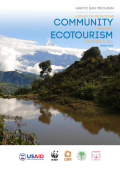
The study has explored how the local community’s involvement in the tourism activities under Community Based Ecotourism (CBET) can be increased through small interventions and partnerships.
In order to gain insight from existing CBET activities in Nepal, a rapid assessment of two existing community based ecotourism destinations, namely the Baghmara...
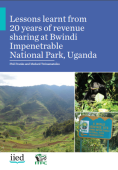
For the past 20 years a revenue-sharing scheme has been in place for communities surrounding Bwindi Impenetrable National Park, Uganda. The learning evaluation Lessons Learnt from 20 Years of Revenue Sharing at Bwindi Impenetrable National Park, Uganda looks at how revenue sharing might become more effective and more equitable.
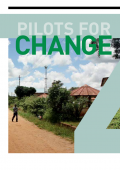
The case study Pilots for Change: Zambia's Pilot Houses looks at how these houses were built to test and demonstrate ways of incorporating sustainable principles in the construction of comfortable and affordable homes.
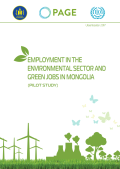
The report Employment in the Environmental Sector and Green Jobs in Mongolia describes a pilot survey which was conducted to collect data on environmental sector employment and green jobs in Mongolia.
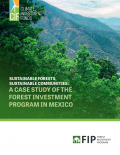
The case study Sustainable Forests, Sustainable Communities: A Case Study of the Forest Investment Program in Mexico explores the outcomes of the FIP in Mexico, finding that the program has been successful in achieving a mix of objectives.
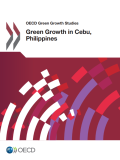
The report Green Growth in Cebu, Philippines explores policies and governance systems to promote green growth in Metro Cebu, Philippines, and provides recommendations for enhancing Cebu’s green growth potential.
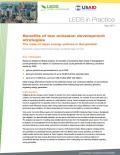
The case study Benefits of Low Emission Development Strategies: The Case of Clean Energy Policies in Bangladesh summarises the Resources to Advance LEDS Implementation (RALI) project’s modelling efforts and quantifies the potential job impacts associated with two different clean energy scenarios.

The report Mobilizing Sustainable Finance for Small and Medium Sized Enterprises: Reviewing Experience and Identifying Options in the G7 takes stock of existing activities in G7 countries, identifies a range of emerging lessons and suggests possible next steps for action by G7 countries.
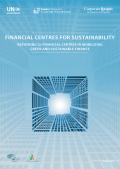
The report Financial Centres for Sustainability: Reviewing G7 Financial Centres in Mobilizing Green and Sustainable Finance has been prepared to explore how financial centres can contribute to the delivery of the Sustainable Development Goals (SDGs) and the Paris Climate Agreement.
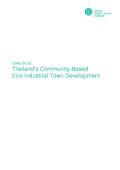
This report Thailand’s Community-Based Eco-Industrial Town Development found some potential lessons learned from Thailand’s Eco Industrial Town program and opportunities for improvement.
